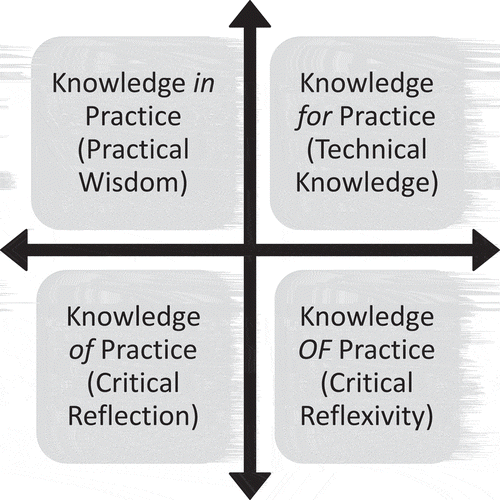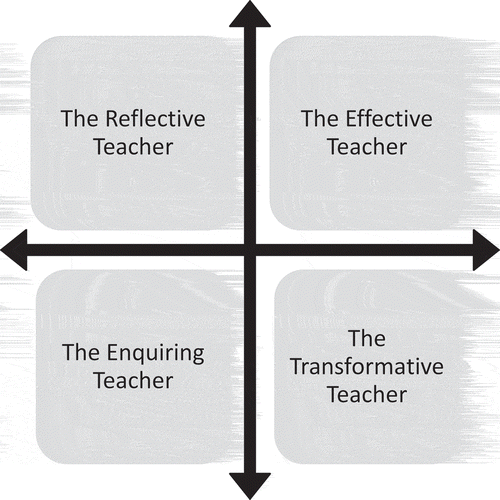The research field of teacher education is varied and diverse, drawing on a wide range of theories and methodological approaches. One of the metaphors, however, used to think and undertake research in the field of teacher education, is reflection. The terms reflection, and reflective practice have a diversity of meanings even when used within similar theoretical and methodological frameworks. However, despite this caveat, a number of scholars have distinguished between different modes of reflection, focussing specifically on the relation between theory/research knowledge and practice (see Appleton, Citation1996; Cochran-Smith & Lytle, Citation1999; Evans, Citation1976; Gore, Citation2017, Citation1987; Lunn Brownlee et al., Citation2019; Moore, Citation2004; Menter, Citation2009; Nuttall, Murray, Seddon, & Mitchell, Citation2006; Stenberg, Rajala, & Hilppo, Citation2016).
In , we have taken Cochran-Smith and Lytle (Citation1999) distinction of knowledge for, in and of practice and mapped it onto a quadrant to think about teachers’ work and possibilities for change. The vertical axis depicts a continuum with change at the level of the individual in the top of the quadrant and change in social groups at the bottom of the quadrant. The horizontal axis depicts a continuum of knowledge types with emphasis on the left side with teachers’ practical knowledge and enquiry skills, and on the right side with codified knowledge, for example knowledge produced by researchers and published in research journals, books and so forth.
So, moving anti-clockwise from the upper right quadrant: knowledge for practice equates to technical/instrumental knowledge – teachers make use of the knowledge produced by others to reflect on and improve classroom practices. The findings in research papers are codified into checklists, strategies, tips for consumption by teachers. The underlying assumption in this framing is that knowing more leads to more effective practices. To improve teaching practices, teachers need to implement into practice research knowledge produced by experts outside of classrooms. By contrast, knowledge in practice equates to teachers’ practical wisdom. The implicit image is the wise practitioner making complex decisions amidst uncertainty and changing situations. The practical knowledge produced by teachers in practice is not simply instrumental or formulaic but is craft, embodied knowledge often articulated in oral rather than written modes, and in the production of artefacts/objects, rather than codified as research papers. Teachers invent knowledge in action and make this knowledge explicit to others through deliberation and discussion. In current evidence-based policy discourses, this knowledge is often derided as mere anecdote, lunch-time stories, or coffee conversations.
Knowledge of practice suggests that all involved in the education process adopt an enquiry stance, and both knowledge generation and knowledge use are problematized through questioning strategies. So questioning is around: what does it mean to generate knowledge, who generates it, what counts as knowledge, to whom, and, how is knowledge used and evaluated in particular contexts. The enquiry stance is aligned with critical social theory and critical educational practice. The knowledge OF practice position adds another dimension expecting teachers and researchers to question the performative aspects of research, the ways in which research performs or generates practices of teaching, rather than simply describing or representing these practices.
While the above diagram attempts to depict the relation between teachers, research and pedagogic practices, the following diagram attempts to depict the relation between teacher education, research and pedagogic practices. Menter, Peters, and Cowie (Citation2017; see also Menter, Citation2009, Citation2017); suggest that initial teacher education programmes across the United Kingdom and Australia can be categorised into four types. We have depicted these four types in .
Moving anti-clockwise around the quadrants again: the effective teacher acquires skills and content to effect change as measured by the impact that teachers have on student learning in the classroom. In the model of the reflective teacher, the emphasis is again on skills and content, but the teacher also acquires knowledge about individual students as learners, and also considers the values informing their work, as well as the purposes of education. The enquiring teacher has all the above sets of knowledge and skills, and engages in research on their own work practices. In the final model, the transformative teacher adopts a critical enquiry stance, by looking beyond the classroom to the wider social context, and considering ethical and moral issues, the purposes of education, and also developing strategic alliances in order to transform social structures.
The set of papers in this edition of the journal all focus on the relation between research, reflective practice and teacher education. The first paper takes the form of an interview where Parlo Singh reflects on her own research trajectory in the field of teacher education.
In the second paper, Yueting Xu, based at the Guangdong University of Foreign Studies, China, and Gary Harfitt, based at the University of Hong Kong, write about the topic of teaching English as a Foreign Language (EFL) in the Higher Education Sector in China. The focus of their study is on the pedagogy of assessment for learning (AfL) drawing on the experiences of three teachers working with large classes. The authors write about both the pedagogical challenges of implementing AfL, as well as the feasibility of using AfL taking account of teacher agency or agentic choices and the contexts-for-actions. They conclude the paper by considering the pedagogic affordances of and challenges on teacher education policies and practices. Crucially, the authors discuss how teachers matter in terms of quality learning and student learning outcomes.
Nicole Albrecht based at RMIT University in Melbourne, Australia explores the topic of mindfulness and wellbeing/wellness. Her study uses a qualitative research approach by generating data from interviews with eight teachers from Australia and the United States. The specific focus of the paper is on the pedagogy of mindfulness. Questions are raised about who teaches mindfulness in initial and ongoing teacher education, and how teachers translate this knowledge into their own pedagogic work. Albrecht suggests that pedagogies of mindfulness are a response to increased levels of stress experienced by students and teachers. The paper specifically explores the practical wisdom of teachers’ work in the space of mindfulness pedagogy. Of particular note is the discourse about the growth of the field of mindfulness and teaching children mindfulness over the past two decades.
Rebecca Cooper, based at Monash University in Melbourne, Australia, writes about dispositions and pedagogical knowledge for science teacher educators. She considers the role of dispositions, defined as changing beliefs and perceptions, to the formation of pedagogical knowledge. Of note is Cooper’s claim that there is limited research undertaken on what teacher educators do in terms of teaching others about teaching. Using a qualitative interview-based methodology, Cooper analyses data generated from interviews with eight participants working across four different Australian universities, and at various stages of their own teacher education career.
Khalid Arar, Zuzo Ruthvsky, Donitsa Smadar-Schmidt, Ricardo Trumper, and Judith Barak, all predominantly based in Colleges of Education in Israel, explore teachers’ motivations for studying in a Master of Education programme offered in a teacher training college. The authors argue that since 2004 the professional development of teachers in these institutions has followed two different teaching approaches: (1) top-down transmission of knowledge and (2) bottom-up transformative studies to support teachers’ professional autonomy. The authors generated data for their study from multiple sources, namely, academic program documents, government policies, and surveys completed by teachers graduating from Masters of Education programs over the past decade. They found that significantly more programs promote a bottom-up transformative model of teacher professional development and teachers’ preferences are towards this approach because it builds on, and encourages teachers to reflect on their own practical knowledge.
In the next paper, Marianne Pale, based at Swinburne University of Technology, Melbourne, develops a conceptual framework for a new model of culturally and linguistically responsive pedagogy for the New Zealand educational context. The proposed new model aims to cater for the needs of the large Pacific Islander population in New Zealand. Building on socio-cultural theory and Vygotsky’s concept of the zone of proximal development, the model draws on Tongan epistemology to conceptualise the intersection of culture and pedagogy. Of note is the exploration of Tongan concepts of teaching, learning and the purposes of education.
John Trent from The Education University of Hong Kong explores the topic of why some graduating teachers choose not to teach, and thus adds to the discussion on teacher attrition and the theory-practice gap. He draws on interview data generated from a cohort of six graduates from an initial teacher education (ITE) program in Hong Kong who chose not to teach. All the participants had completed the same five-year ITE program aimed at preparing graduates for teaching English in primary or secondary schools in Hong Kong. The focus of the data analysis was on any critical incidents occurring during the ITE program, and particularly during the teaching practicum that may have led the graduates to decide not to enter the teaching profession.
Acknowledgments
We would like to conclude this editorial by thanking and acknowledging three reviewers who have joined our recently established College of Reviewers for the Asia-Pacific Journal of Teacher Education. Thank you and welcome:
Dr Catherine Adern – University of Southern Queensland, Australia
Professor Shelley Dole – University of the Sunshine Coast, Australia
Professor Karen Dooley – Queensland University of Technology, Australia
References
- Appleton, K. (1996). Using learning theory to guide reflection during school experience. Asia-Pacific Journal of Teacher Education, 24(2), 147–157.
- Cochran-Smith, M., & Lytle, S. L. (1999). Chapter 8: Relationships of knowledge and practice: Teacher learning in communities. Review of Research in Education, 24(1), 249–305.
- Evans, G. (1976). The continuous education of teachers: Reflections on the 1976 conference. South Pacific Journal of Teacher Education, 4(3), 192–204.
- Gore, J. (2017). Reconciling educational research traditions. The Australian Educational Researcher, 44(4–5), 357–372.
- Gore, J. M. (1987). Reflecting on reflective teaching. Journal of Teacher Education, 38(33), 33–39.
- Lunn Brownlee, J., Rowan, L., Ryan, M., Walker, S., Bourke, T., & Churchward, P. (2019). Researching teacher educators’ preparedness to teach to and about diversity: Investigating epistemic reflexivity as a new conceptual framework. Asia-Pacific Journal of Teacher Education, 1–21. doi:10.1080/1359866X.2018.1555794
- Menter, I. (2009). Teachers for the future: What have we got and what do we need? In S. Gerwitz, P. Mahony, I. Hextall, & A. Cribb (Eds.), Changing teacher professionalism: International trends, challenges, and ways forward (pp. 3–16). London: Routledge.
- Menter, I. (2017). Making connections in the UK and Australia—research, teacher education and educational improvement. In M. A. Peters, B. Cowie, & I. Menter (Eds.), A companion to research in teacher education (pp. 667–676). Singapore: Spinger.
- Menter, I., Peters, M. A., & Cowie, B. (2017). A companion to research in teacher education. In M. A. Peters, B. Cowie, & I. Menter (Eds.), A companion to research in teacher education (pp. 1–14). Singapore: Springer.
- Moore, A. (2004). The Good Teacher. Dominant discourses in teaching and teacher education. Oxon: Routledge.
- Nuttall, J., Murray, S., Seddon, T., & Mitchell, J. (2006). Changing research contexts in teacher education in Australia: Charting new directions. Asia‐Pacific Journal of Teacher Education, 34(3), 321–332.
- Stenberg, K., Rajala, A., & Hilppo, J. (2016). Fostering theory–Practice reflection in teaching practicums. Asia-Pacific Journal of Teacher Education, 44(5), 470–485.


